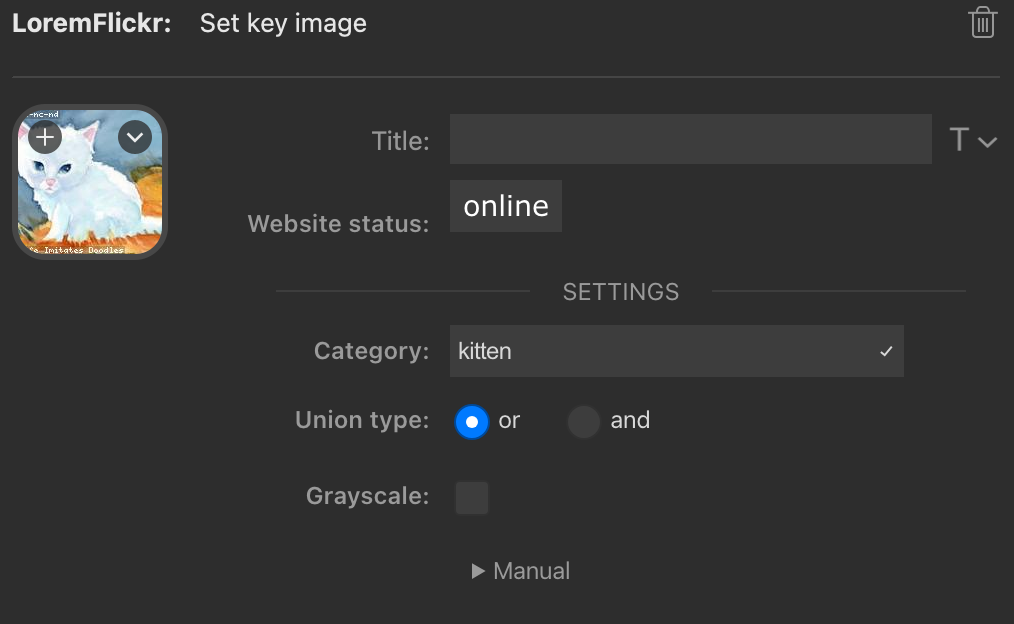Stream Deck Plugin for installing images from LoremFlickr to button.
LoremFlickr official website: https://loremflickr.com/
Property Inspector preview: click
Operating systems:
- MacOS: 10.14 or later
- Windows: 10 or later
Stream Deck application: 6.0, 6.1, 6.2, 6.3, 6.4, 6.5, 6.6, 6.7
Python: 3.8 or later
If you have difficulty, then look at articles or videos on the Internet about it.
-
Download Python from the official website and install it: https://www.python.org/downloads/
⚠️ Python version must be 3.8.0 or later. -
Check that Python is available from the command line:
MacOS
Open the
Terminalapplication, enter the command below and press Return(Enter):python3 -V
If you get a response that looks like
Python 3.10.4, then you have done everything right.If there is no response, then you have installed Python incorrectly.
Windows
Open the
Command Promptapplication, enter the command below and press Return(Enter):python -V
If you get a response that looks like
Python 3.10.4, then you have done everything right.If there is no response, then you have installed Python incorrectly.
-
Restart your computer.
Download the Stream Deck app from the official website and install it: https://www.elgato.com/en/downloads
⚠️ During the installation of the plugin, you must have internet access.
Errors may occur during installation. If they are, then a message about it will appear on the screen.
Latest release: https://github.com/gri-gus/loremflickr-streamdeck-plugin/releases
You need to download a file called com.ggusev.loremflickr.streamDeckPlugin. Once downloaded, double-click on it. The
Stream Deck application prompts you to install the plugin.
After installation, you will have a LoremFlickr category and actions:
⚠️ The button may not start working immediately after installing the plugin, but after about 40 seconds. At this time, dependencies are installed. If you do not receive an error message on the screen, but an exclamation mark is displayed when you click on the button, then the plugin is not fully installed yet, and you need to wait. This only happens after installing the plugin. There is no need to wait for the next use.
Drag the Set key image action from LoremFlickr category to the desired button.
Click on the button, and you will see the Property Inspector where you can adjust some settings. See the Manual
section
in the Property Inspector for more details.
Each time you press the button on the Stream Deck, the picture will be updated.
Stream Deck does not have the ability to run Python files, but it does have the ability to run .bat and .sh files.
But it all starts with the manifest.json file, which contains "CodePathMac": "run.sh" and "CodePathWin": "run.bat"
. These are scripts that are run depending on the system.
Files run.sh for MacOS or run.bat for Windows: startup scripts, entry points. They set environment variables, check
whether Python is installed (if not, an error window pops up), and run the init.py script. Based on the result
from init.py, if everything is fine, then the main.py file is launched and the plugin is launched, and if not, then
an error window pops up. This happens every time you restart the Stream Deck application and when you reinstall/update
the plugin.
What is the init.py file? This is a script that is responsible for the virtual environment and dependencies. Why can't
we immediately add venv to the built version of the plugin? Because a user with a system/hardware different from the
one on which venv was made may encounter compatibility problems. Therefore, for Python, everyone should have their own
virtual environment for each project. The init.py file is responsible for creating the virtual environment, installing
dependencies from requirements.txt, and checking that everything is installed correctly. It also runs every time you
restart the Stream Deck application and when you reinstall/update the plugin. But if the virtual environment has already
been created and the dependencies are installed, then init.py simply checks that everything is installed correctly.
Later, the main.py file comes into play, which contains the plugin logic.



